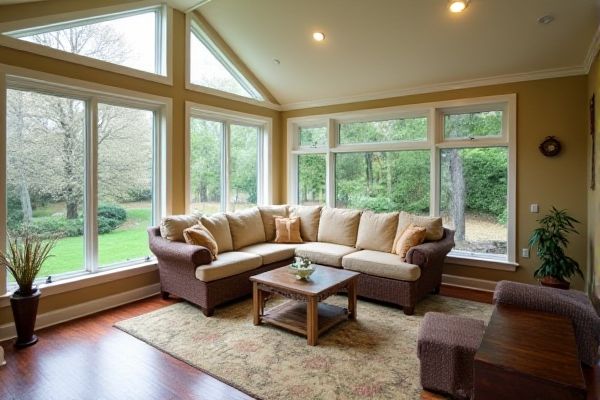
Prefab sunrooms offer quicker installation and lower costs with standardized designs, while custom-built sunrooms provide tailored aesthetics and materials to match your home's unique style and needs. Explore the rest of the article to discover which option best fits your lifestyle and enhances your living space.
Table of Comparison
| Feature | Prefab Sunroom | Custom-Built Sunroom |
|---|---|---|
| Cost | Lower initial cost; factory-made components reduce expenses | Higher cost; tailored design and materials increase price |
| Construction Time | Faster installation; modules manufactured off-site | Longer build time; on-site customization and craftsmanship needed |
| Design Flexibility | Limited styles and sizes; standardized options | Fully customizable to fit specific preferences and space |
| Quality and Materials | Consistent factory quality; limited material choices | High-quality materials chosen by owner; premium finishes available |
| Permits and Regulations | Typically easier permits due to standard designs | May require extensive permits and inspections |
| Energy Efficiency | Standard insulation and glazing; moderate efficiency | Custom insulation, glazing, and HVAC options for better efficiency |
| Resale Value | Moderate impact; depends on quality and fit | Higher impact; tailored design adds property value |
Introduction to Sunrooms: Prefab vs Custom-Built
Prefab sunrooms offer quick installation and cost-effective solutions with standardized designs, ideal for those seeking efficiency and budget-friendly options. Custom-built sunrooms provide tailored architectural details and personalized layouts, enabling you to match your home's style and specific spatial needs. Choosing between prefab and custom-built sunrooms depends on balancing your desired level of customization, project timeline, and investment preferences.
Key Differences Between Prefab and Custom-Built Sunrooms
Prefab sunrooms are manufactured in controlled factory settings, offering quicker installation and lower costs compared to custom-built sunrooms, which are tailor-designed to fit unique architectural styles and personal preferences. Custom-built sunrooms provide greater flexibility in design, materials, and dimensions but require longer construction times and higher budgets. Your choice depends on prioritizing affordability and speed with prefab options or opting for personalized, high-quality craftsmanship in custom-built sunrooms.
Cost Comparison: Prefab Sunrooms vs Custom-Built Sunrooms
Prefab sunrooms generally offer a more cost-effective solution compared to custom-built sunrooms, with prices often 20-40% lower due to standardized materials and streamlined installation processes. Custom-built sunrooms require higher investment because of bespoke designs, premium materials, and extended labor costs that cater to specific architectural requirements. Evaluating your budget and long-term value, prefab sunrooms provide affordable quality, while custom options deliver tailored aesthetics and potential home value appreciation.
Design Flexibility: Customization Options Explored
Custom-built sunrooms offer extensive design flexibility, allowing homeowners to tailor dimensions, materials, and architectural details to match their specific aesthetic and functional needs. Prefab sunrooms provide limited customization options, typically available in standard sizes and designs, which may restrict unique stylistic choices. Selecting a custom-built sunroom enables personalized integration with existing structures, ensuring a cohesive and distinctive addition to the home.
Installation Process and Timeline
Prefab sunrooms offer a streamlined installation process with most components manufactured off-site, allowing for assembly on location within days to weeks. Custom-built sunrooms require more extensive on-site construction, involving detailed measurements, permits, and tailored designs, often extending the timeline to several weeks or months. Choosing prefab options significantly reduces installation complexity and overall project duration compared to custom-built sunrooms.
Material Quality and Durability Analysis
Prefab sunrooms often use standardized materials that are mass-produced, which can result in consistent but sometimes lower-grade quality compared to custom-built options. Custom-built sunrooms allow for selective use of premium materials such as double-glazed windows, reinforced aluminum frames, and weather-resistant composites, enhancing durability and lifespan. Your investment in a custom-built sunroom generally ensures superior material quality tailored to withstand local climate conditions more effectively.
Energy Efficiency and Insulation Features
Prefab sunrooms often incorporate standardized energy-efficient materials and insulation features designed to meet general climate requirements, making them a cost-effective option. Custom-built sunrooms allow for tailored insulation solutions such as high-performance glazing, specialized thermal barriers, and optimized sealing techniques that enhance your space's energy efficiency in any specific environment. Your choice between prefab and custom options will directly impact heat retention, cooling costs, and overall comfort throughout the year.
Maintenance Requirements and Longevity
Prefab sunrooms offer lower maintenance requirements due to factory-sealed joints and standardized materials like vinyl or aluminum, ensuring resistance to weather elements and reducing the need for frequent repairs. Custom-built sunrooms provide enhanced longevity with durable, high-quality materials tailored to specific climate conditions, but they may require more specialized upkeep such as periodic sealing, painting, or wood treatment. Homeowners seeking minimal maintenance often prefer prefab options, while those prioritizing long-term durability and customization invest in custom-built sunrooms designed for extended lifespan.
Resale Value and ROI Considerations
Prefab sunrooms offer a quicker installation and lower initial cost, which can attract cost-conscious buyers and provide a moderate return on investment. Custom-built sunrooms increase resale value more significantly by offering tailored designs that enhance home aesthetics and functionality, appealing to buyers seeking unique, high-quality spaces. Homeowners should weigh the upfront savings of prefab options against the higher long-term ROI potential of custom-built sunrooms when considering resale value.
Choosing the Right Sunroom for Your Needs
Prefab sunrooms offer quick installation and cost-effective options with standardized designs, making them suitable for those seeking convenience and budget-friendly solutions. Custom-built sunrooms provide tailored layouts, materials, and features, ideal for maximizing space and matching your home's architectural style. Evaluate your priorities regarding budget, timeline, and design flexibility to choose the sunroom that best fits your lifestyle and enhances your living space.
 homyna.com
homyna.com